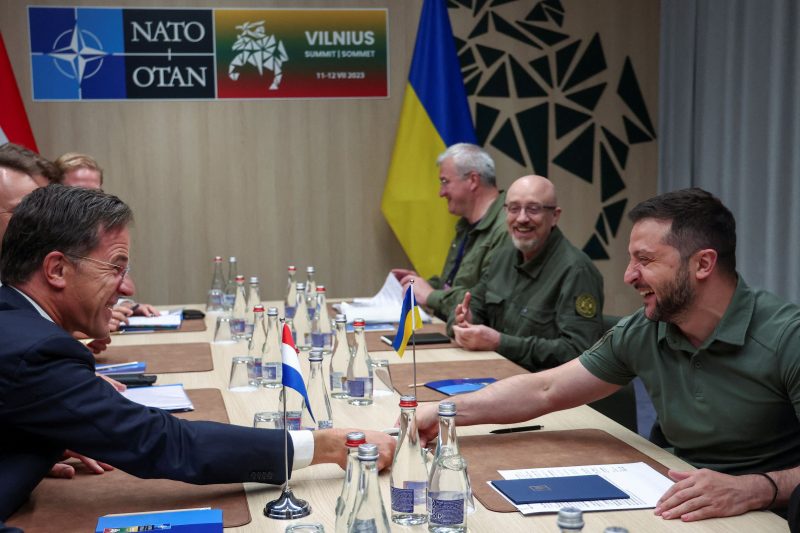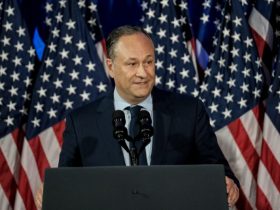VILNIUS, Lithuania — President Biden and several world leaders will announce a major security assurance program Wednesday designed to protect Ukraine from another invasion like the one conducted by Russia last year, the White House said.
“The United States, along with G-7 leaders, will announce our intent to help Ukraine build a military that can defend itself and deter future attack,” Amanda Sloat, National Security Council director for Europe, told reporters Wednesday, the final day of the NATO summit in Vilnius, Lithuania.
The United Kingdom hailed the new program as a “major step toward ending the war” and suggested it would deter future acts of aggression against Kyiv.
“We can never see a repeat of what has happened in Ukraine and this declaration reaffirms our commitment to ensure it is never left vulnerable to the kind of brutality Russia has inflicted on it again,” Prime Minister Rishi Sunak said in a statement.
Biden and the other leaders from the Group of Seven wealthiest countries plan to stand alongside Ukrainian President Volodymyr Zelensky after the conclusion of the NATO summit to officially unveil the security pact.
The announcement comes a day after NATO leaders declined to provide a timeline for when Ukraine would be able to join the alliance, a move that led Zelensky to lash out at the group in a blunt tweet. While a security pact does not provide the same kind of joint defense protections that NATO membership offers, it could significantly bolster Ukraine’s ability to defend itself from attack, according to diplomats and scholars.
The goal would be to ensure Ukraine has confidence in its global support over the long term, something that leaders hope will discourage Russia from continuing to pursue a war that is deep into its second year, Sloat said.
“This process will ensure that the military assistance we provide Ukraine to defend itself against Russian aggression continues to be part of a long-term investment in Ukraine’s future force,” she said. “We’ll focus on ensuring Ukraine has a sustainable fighting force capable of defending Ukraine now and deterring Russian aggression in the future.”
White House officials did not provide a timeline for how long it might take for the bilateral security commitments to be reached, though several G-7 countries have announced new forms of military and humanitarian support for Ukraine during the NATO summit.
Biden, who plans to meet with Zelensky on Wednesday afternoon, has previously said he could envision a security arrangement with Ukraine similar to the kind of support the United States provides to Israel. With strong support in Congress, Washington provides more than $3.8 billion annually in military aid to Israel.
It’s not clear if Biden can muster the same level of bipartisanship for funding the ongoing war in Ukraine. Some Republicans in Congress have balked at the billions of dollars U.S. taxpayers have already sent to bolster Ukraine against Russia, and House Speaker Kevin McCarthy (R-Calif.) has said Kyiv should not have a “blank check” for its defense. Several Republican presidential candidates, who hope to oust Biden from office, have also questioned the wisdom of sending money and arms to Kyiv.
Zelensky, who tweeted Tuesday that “uncertainty is weakness,” had hoped to leave the NATO summit with more concrete language about his country’s bid to join the alliance. He said the alliance’s failure to offer that would only motivate Russia to “continue its terror.”
But a series of long-term bilateral commitments to Ukraine from G-7 members the United States, Britain, Canada, France, Germany, Italy and Japan could be significant in convincing Russian President Vladimir Putin that he cannot prevail in a prolonged war, said Max Bergmann, a former State Department official who leads the Europe Program at the Center for Strategic and International Studies.
“I think the most important thing that can really come out of this summit is a sort of Israel-style commitments to the long-term security of Ukraine in the form of tangible long-term security assistance commitments,” Bergmann said before the summit. “It’s really important that the Europeans also make that commitment, that if there is an election that goes a certain way in Washington in 2024 that European commitments will be there.”
The announcement follows months of discussions among G-7 leaders and Kyiv, and will also include efforts to strengthen Ukraine’s economy and carry out good governance reforms, according to a White House official who spoke on the condition of anonymity to preview conversations. Biden administration officials are expecting other countries will want to join after the announcement, the official said. Negotiations between Washington and Kyiv on the contours of the bilateral security package will begin soon, the official said.
Biden is expected to tout the announcement as well as his broader global vision during a speech in Vilnius later Wednesday. The White House has billed the speech as the highlight of the president’s five-day, three-country trip to Europe which will conclude Thursday in Helsinki.
“The president will talk about how the widespread support for Ukraine is reflective of the value of our alliances and partnerships, which he has revitalized since taking office,” said Sloat. “It’ll be a memorable speech as the president spends the week in the middle of the world stage.”








